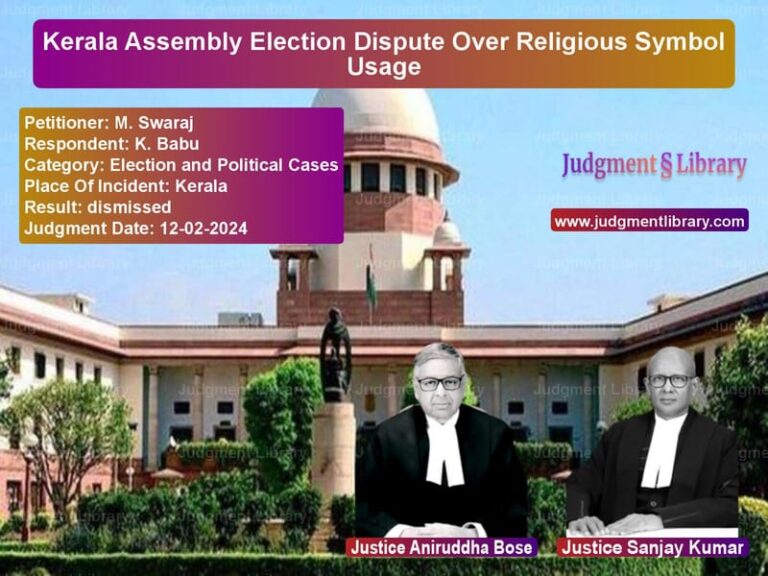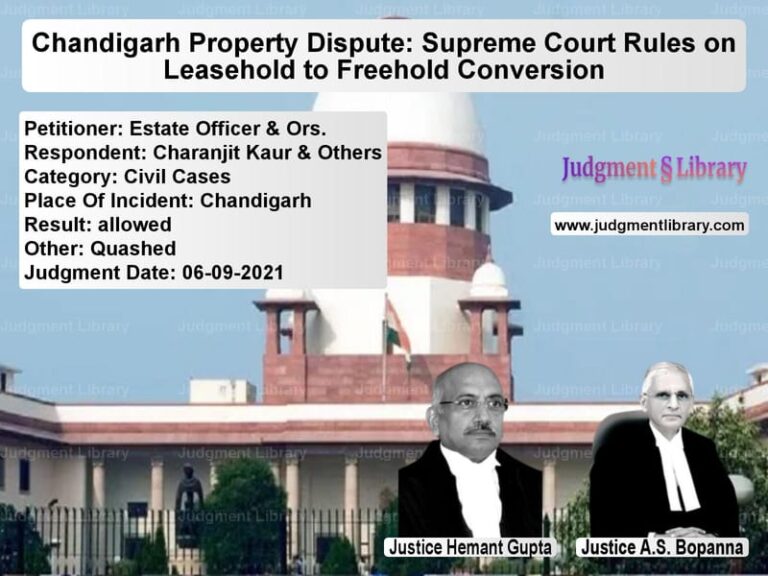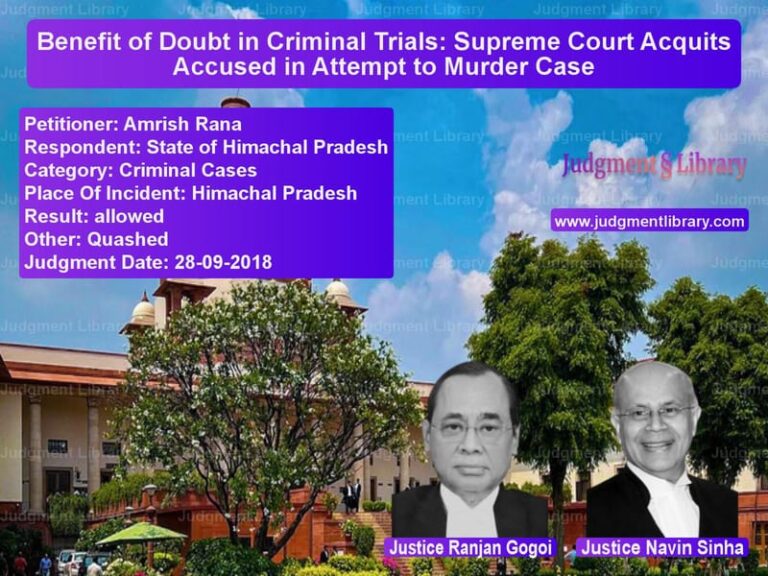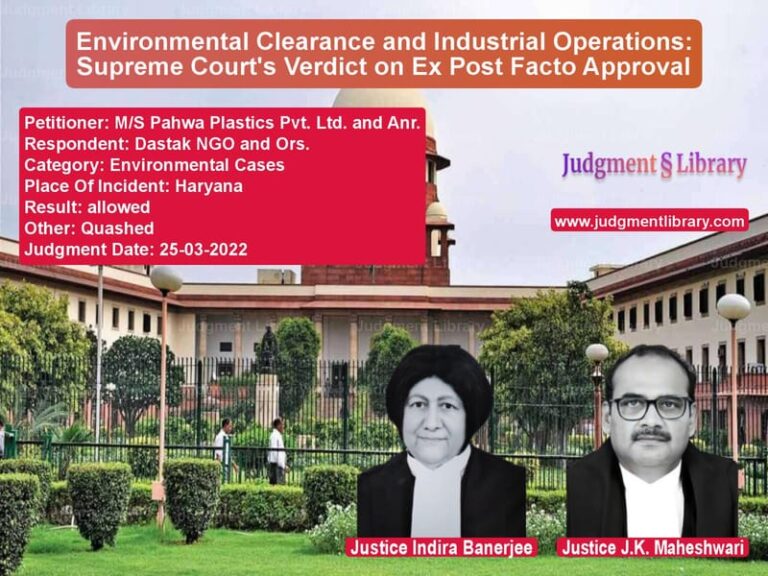Municipal Development Plan Dispute: Supreme Court Rules on Land Use and Regulations
The case of Municipal Corporation of Greater Mumbai vs. M/s Dattani Developers revolves around a significant dispute over land use and development regulations within Mumbai’s urban development planning. The issue arose when the Municipal Corporation sought to enforce changes to the city’s development plan, which was contested by private land developers. The petitioners, M/s Dattani Developers, sought to challenge the changes under the argument that they were being unfairly affected by the new provisions. The Supreme Court ultimately ruled in favor of the Municipal Corporation, reinforcing the principle that local authorities have the power to modify development plans for better urban management and environmental sustainability.
Background of the Case
The dispute centered on a piece of land in the bustling area of Andheri, Mumbai. M/s Dattani Developers had acquired the land with the intention of constructing a mixed-use commercial and residential project. The land was initially designated under the city’s development plan for residential use. However, a new amendment was introduced in the development plan that reclassified the area as a ‘No Development Zone,’ effectively preventing any further construction.
The developers, after obtaining initial permits and planning approvals, challenged the amendment, claiming that the new regulation was arbitrary and infringed on their investment rights. The Municipal Corporation argued that the amendment was made to preserve green spaces and to prevent further overcrowding in an already densely populated area.
Petitioners’ Arguments (M/s Dattani Developers)
- “We were granted initial approval for the project and spent considerable resources to secure these permits. The amendment to the development plan was introduced without adequate public consultation and directly impacts our property rights.”
- “The reclassification of the area as a ‘No Development Zone’ is in violation of prior agreements and does not align with the principles of fairness in urban planning.”
- “The Municipal Corporation’s decision was unilateral, and no alternative provisions were provided to compensate the developers for their financial losses.”
Respondents’ Arguments (Municipal Corporation of Greater Mumbai)
- “The amendment to the development plan was made with the welfare of the public in mind, ensuring the preservation of open spaces and addressing environmental concerns in a rapidly growing city.”
- “The petitioners’ claims are based on outdated approvals and permits that do not account for the more recent urban development needs, such as addressing the city’s overburdened infrastructure.”
- “Urban planning decisions are within the legal authority of the Municipal Corporation and are designed to ensure long-term sustainability and public welfare.”
Supreme Court’s Observations
The Supreme Court examined the legality of urban planning decisions, particularly focusing on the rights of private developers versus public welfare needs. The Court made the following key observations:
- “Urban planning must be approached with long-term vision, balancing development needs with environmental sustainability. Local authorities are vested with the responsibility of ensuring that development plans align with the city’s broader goals.”
- “In the present case, the reclassification of land as a ‘No Development Zone’ was not arbitrary, but a well-founded decision based on the growing need for green spaces and congestion control in a megacity like Mumbai.”
- “While private investments are important, they cannot be placed above the larger public good, especially when the issue of urban overcrowding and environmental sustainability is at stake.”
The Court further emphasized, “The city’s development plan is a reflection of democratic urban governance, where the interests of both individuals and the public must be carefully balanced. The protection of public spaces and the reduction of congestion are crucial for maintaining a livable city.”
Final Judgment
The Supreme Court ruled in favor of the Municipal Corporation, dismissing the petitioners’ claims:
- The amendment to the development plan, which reclassified the area as a ‘No Development Zone,’ was upheld as a valid exercise of the Municipal Corporation’s authority.
- The Court emphasized that urban planning decisions, when made in the interest of public welfare, should be respected by all parties, even if they interfere with private investments.
- The developers were not entitled to compensation as the reclassification was in line with statutory provisions aimed at ensuring better city management and environmental preservation.
Implications of the Judgment
The judgment has far-reaching implications for urban planning and property rights:
- It reinforces the power of local authorities to amend urban development plans for public welfare purposes, even at the expense of private development projects.
- Developers must be aware that urban planning decisions are subject to change to reflect evolving public needs and environmental concerns.
- The ruling sets a precedent that the welfare of the public can take precedence over private property rights in matters of urban development.
This case serves as a reminder that in large cities, where the balance between development and sustainability is delicate, local governments have the final say in maintaining a sustainable environment for all residents.
Petitioner Name: M/s Dattani Developers.Respondent Name: Municipal Corporation of Greater Mumbai.Judgment By: Justice Arun Mishra, Justice Indira Banerjee, Justice M.R. Shah.Place Of Incident: Mumbai.Judgment Date: 24-04-2020.
Don’t miss out on the full details! Download the complete judgment in PDF format below and gain valuable insights instantly!
Download Judgment: Ms Dattani Develope vs Municipal Corporatio Supreme Court of India Judgment Dated 24-04-2020.pdf
Direct Downlaod Judgment: Direct downlaod this Judgment
See all petitions in Contract Disputes
See all petitions in Property Disputes
See all petitions in Landlord-Tenant Disputes
See all petitions in Judgment by Arun Mishra
See all petitions in Judgment by Indira Banerjee
See all petitions in Judgment by Mukeshkumar Rasikbhai Shah
See all petitions in dismissed
See all petitions in supreme court of India judgments April 2020
See all petitions in 2020 judgments
See all posts in Civil Cases Category
See all allowed petitions in Civil Cases Category
See all Dismissed petitions in Civil Cases Category
See all partially allowed petitions in Civil Cases Category







